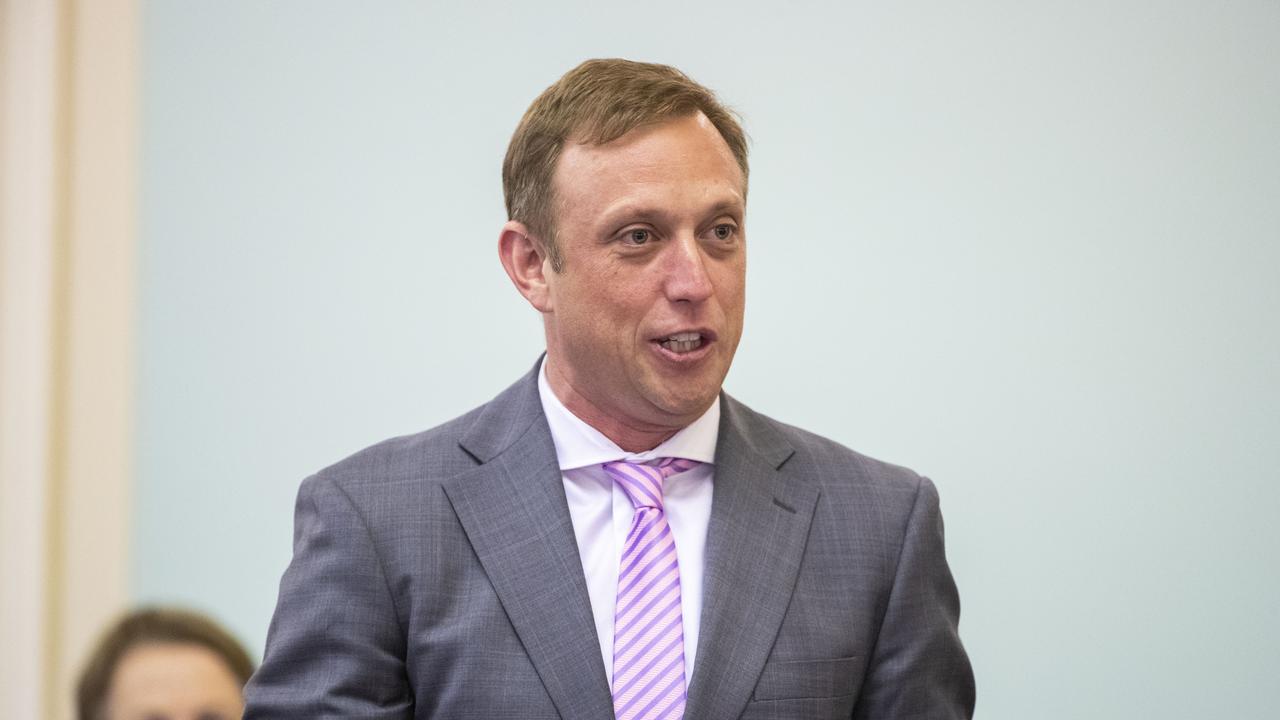Mike Ahern’s startling claims: Joh Bjelke-Petersen thought AIDS was Aborigines’ punishment
FORMER premier Mike Ahern has revealed some of Queensland’s darkest secrets including how Sir Joh Bjelke-Petersen wanted Aborigines infected with AIDS to be left to die, believing it was a just punishment from God.

QLD Politics
Don't miss out on the headlines from QLD Politics. Followed categories will be added to My News.
- New inquest for Whiskey Au Go Go fire
- Questions linger over nightclub blaze
- Ahern blames ex-cop for pedo gang cover-up
- Ahern’s property move: Nobody’s laughing at me now
FORMER premier Mike Ahern has revealed some of the state’s darkest secrets including how Sir Joh Bjelke-Petersen wanted Aborigines infected with AIDS to be left to die and how authorities knew the state’s biggest mass murderer convicted of torching the Whiskey Au Go Go nightclub was innocent, but left him to rot in jail anyway.
Mr Ahern, who broke his silence in an exclusive interview with The Courier-Mail, also revealed corrupt minister Russ Hinze, who paved the way for Ahern’s own premiership, was a gambling addict.
He said former premier Joh Bjelke-Petersen tried to stop Aboriginal and Torres Strait Islanders being screened for AIDS because he believed the disease was a just punishment from God.
Mr Ahern became Health Minister in Bjelke-Petersen’s Cabinet in 1987 and toppled him as premier months later.
He said that infection control experts from the department of health privately warned him that HIV-AIDS could wipe out entire indigenous communities in Queensland, as it had in Africa.
Mr Ahern defied his premier and secretly ordered blood tests on every Aboriginal and Torres Strait Islander in the state.
“Joh was aggressive towards me in relation to this,’’ he said.
“He felt that somehow or other God was punishing these people and I should leave it alone and let God look after his own. I said I can’t do that.”

Mr Ahern said a safe-sex education program began.
He said “three or four” men who tested positive for HIV-AIDS on Palm Island were sent to Sydney for specialist care.
“There was no epidemic. And we saved hundreds of lives,” he said.
Mr Bjelke-Petersen, the son of a Lutheran pastor, also warned Mr Ahern that church leaders wanted him sacked for his AIDS education program.
However, the Uniting Church, Lutherans, the Church of England and the Catholic Church all praised his efforts, he said.


In a fierce debate in Parliament on April 7, 1987, Mr Bjelke-Petersen accused the ALP of promoting the type of lifestyle which spread AIDS. He suggested a sexually permissive lifestyle “came natural” to the Opposition because, he said, they practised it.
Mr Ahern rebuffed Mr Bjelke-Petersen by recruiting Sr Angela Mary from the Mater Hospital run by the Catholic Church to carry the safe-sex message to the homosexual community in Queensland.

One meeting at the Hilton Hotel was especially well attended.
Sr Angela Mary told Mr Ahern: “You’ll never guess who was there, and no, I’m not telling you.”
Mr Ahern’s explosive revelations also include that there were deliberate attempts to thwart the Fitzgerald Inquiry.
He said a special independent police squad set up to assist Inquiry boss Tony Fitzgerald was given cars that broke down, two-way radios that didn’t work and pistols with faulty hammers.
Crooked cops, he said, wanted Mr Fitzgerald to fail. They were the same cops who also successfully derailed a National Crime Commission probe into money laundering on the Gold Coast, Mr Ahern said.

The 75-year-old spoke to The Courier-Mail after winning a lifetime achievement award from the Former Parliamentary Members’ Association of Queensland for “exemplary conduct and community service”.
Awards committee chairman David Muir said Mr Ahern was honoured for driving Fitzgerald reforms that halted many corrupt practices.
The Whiskey Au Go Go nightclub in Fortitude Valley exploded into flames on March 8, 1973, and 15 people burned to death. John Andrew Stuart was convicted of the murders and died in prison.

Mr Ahern welcomed the inquest into the Whiskey Au Go Go fire being reopened, but said government and prison authorities knew Stuart was innocent.
“John Andrew Stuart didn’t do it,” Mr Ahern said.
“We don’t know who did it.”
Mr Ahern visited Stuart in Wacol jail with a parliamentary committee examining crimes of violence. What he saw shocked him.
“We went to the pen where he was. It was called Wacol E. He was in a cage. He was spitting as far as he could, the poor devil. And he was swallowing bits of wire.”
Stuart was clinging to bars and making terrible howling noises like a wounded animal.
“He was frighteningly angry,” he said.
Mr Ahern said that no one at the prison believed Stuart was guilty of torching the nightclub either.
“He was the fall guy. It is a very serious matter. I don’t think he threw the petrol. It’s a fine question, but from what I’ve heard he did not commit the crime.
“He was just a thug, he wasn’t the major manipulator.”
Mr Ahern was told the club was burned on the orders of “criminals from the south”.
Entering Parliament on St Patrick’s Day 1968 aged 25, Mr Ahern at the time was the youngest member to be elected.
“Everyone called me son, even the parliamentary staff,” he said.
He shared a room with Mr Hinze in the country members’ lodge that reminded him of the Toogoolawah Hotel.
“Hinze was a hail fellow, a knockabout fellow,” he recalled. “He was a larrikin.”
Later he would discover Mr Hinze had “a huge gambling problem, huge”.

“He was a bigtime gambler; an expert at backing losing horses — up to 15 grand a bet,” Mr Ahern said.
He was always short of money and was seriously compromised. Mr Hinze died in 1991 aged 72 before corruption charges against him reached court.
“His lawyer Shane Herbert told me Hinze’s case was unanswerable,” Mr Ahern said.
In 1998, Mr Hinze told Mr Ahern he had given up thoughts of becoming premier after Joh.
“So it’s you,” Mr Hinze told him.
Mr Ahern added: “He called Joh the little bloke and he told me it was time for the little bloke to go.
“He said his pension was running down now. In those days after you got to 65 it would reduce.
“Hinze said it was costing him money to stay in the Parliament and he had to get out.
“He said, ‘You’ve got the numbers and I will back you’. And he said, ‘leave me to deal with the little bloke’.”
Mr Hinze told Mr Ahern: “I’ll tell him it’s time for you to go little bloke. You’re out.”
Mr Hinze said that he was going to the races in Kentucky first. The trip to the US would cost taxpayers $30,000 — the same amount he lost on his pension by staying in Parliament too long.
Mr Hinze thought that was fair.

Mr Ahern believes also spoke about his Cabinet colleague Brian Austin, saying he did not deserve to be sent to jail for rorting his expenses.
Austin was convicted on 25 counts of misappropriating $8700 in public funds on private accommodation, travel and meals. He was sentenced to 15 months’ jail.
“I think he got a bit of a bad deal,” he said.
“Today they are abusing their expenses all over the place. They get asked to give the money back,” he said.
“But Brian had to do custodial time. He wasn’t accused of anything else. I thought it was tough.”


